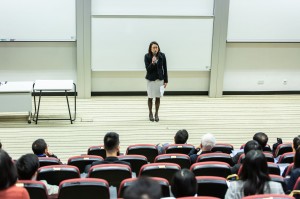
 Become a PowerPoint Guru by Dave Tracy
Become a PowerPoint Guru by Dave Tracy
Learn the methodologies, frameworks, and tricks used by Management Consultants to create executive presentations in the business world.

 Become a PowerPoint Guru by Dave Tracy
Become a PowerPoint Guru by Dave Tracy
Organizations struggle to develop a simple set of guidelines that makes it easier for employees, regardless of position or level, to be confident of  their decisions to meet competing standards of organizations for effective and ethical decision making.
their decisions to meet competing standards of organizations for effective and ethical decision making.
The traditional decision making model taught in most business ethics programs is often beyond the reading comprehension of 25% of the employees’ population. Hence, an alternative model is necessary.
Employees are called upon to make decisions in the normal course of their job. Organizations cannot function effectively if employees are not empowered to make decisions consistent with their positions and responsibilities.
Further, the decision maker has to be confident in the soundness of his decisions. Every decision should be tested against the organization’s policies and values, applicable laws and regulations, as well as the individual employee’s definition of what is right, fair, good, and acceptable.
With these realities, an alternative decision-making model is imperative to address current realities.
To become an Ethical Organization, having a decision making model grounded on foundational ethical decision making is paramount. An Ethical Decision Making Model ensures that the ethical issues inherent in a routine business situation could effectively be surfaced while making it easy for people in the organization to understand and use. To make it more effective, PLUS filters must be embedded within the process.
The ethical component of the decision making takes the form of a set of filters. At key steps in the process, considerations are run through the filters and separate the ethical conations from the remainder of the decision.
PLUS Filters are ethics filters that have adapted to mnemonic word PLUS. PLUS is the mnemonic of Policies, Legal, Universal, and Self. The integration of PLUS Filters in the decision making process is best achieved when there are effective communication and formal mechanism in place.
The PLUS Filters are applied in each of the steps in the decision making process.
P = Policies
L = Legal
U = Universal
S = Self
Integration of PLUS Filters in decision making is best achieved with effective communication and formal mechanism in place.
Let us look at the first step: Defining the Problem.
In defining the problem, we aim to define the difference between the expected and/or desired outcomes and actual outcomes. With the PLUS application, PLUS surfaced the ethical issues and ask the question, “Does the existing situation violate any of the PLUS considerations?”
When the PLUS Filters are applied, this determines if the ethical components of the decision are being surfaced or satisfied.
The use of PLUS Filters in the decision making process can be your barometer in determining if decisions made are within accepted ethical boundaries agreed upon by your company and the environment that the company revolves in.
Interested in gaining more understanding of creating an Ethical Organization through the PLUS Decision Making Model? You can learn more and download an editable PowerPoint about Ethical Organization: PLUS Decision Making Model here on the Flevy documents marketplace.
Are you a management consultant?
You can download this and hundreds of other consulting frameworks and consulting training guides from the FlevyPro library.
In today’s business environment, management consulting firms must be ready to address client challenges and needs that will transform their  business by 10 or 100 times. Tools and methods must be scaled up to ensure applicability to the widest possible audience globally.
business by 10 or 100 times. Tools and methods must be scaled up to ensure applicability to the widest possible audience globally.
The Consulting Workshop Series provides a good understanding of the 10 methods of conducting Workshops that are custom designed to fit specific workshop objectives. Different methods are developed for the purpose of providing organizations the most appropriate tool necessary to support organizations to achieve their strategic goals and targets.
If it is the management’s goal to solicit informed input for policy decisions, then the Citizens Jury is the most appropriate method to undertake.
The Citizens Jury is one of the methods in the Consulting Workshop Series that derives a decision that is representative of average citizens who has been well informed on the issue. It is most applicable when one or more alternatives to a problem need to be selected the various competing interests are arbitrated.
The Citizens Jury can lead to concrete action when this is directly linked to a decision making process.
Making the necessary preparation is the initial step towards organizing a Citizens Jury. While it may not be the main event, it is most critical as it contributes highly to the successful conduct of the event.
The preparation of the Citizens Jury is extensive. To ensure a systematic flow of the Citizens Jury, timelines are essential. Timelines begin after a contract or agreement has been signed and funded for the conduct of the Citizens Jury. Being able to select the appropriate timeline in structuring the Citizens Jury can contribute much to its successful conduct.
Interested in gaining more understanding of the Citizens Jury? You can learn more and download an editable PowerPoint about Consulting Workshop Series: Citizens Jury here on the Flevy documents marketplace.
Are you a management consultant?
You can download this and hundreds of other consulting frameworks and consulting training guides from the FlevyPro library.
Error: Twitter did not respond. Please wait a few minutes and refresh this page.